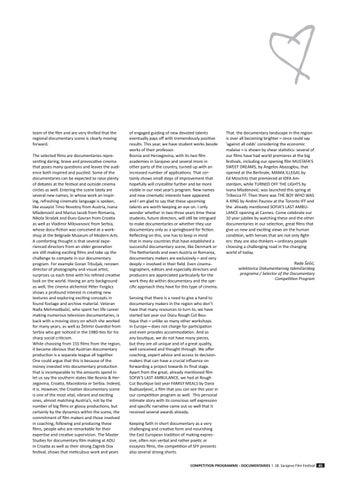team of the film and are very thrilled that the regional documentary scene is clearly moving forward. The selected films are documentaries representing daring, brave and provocative cinema that poses many questions and leaves the audience both inspired and puzzled. Some of the documentaries can be expected to raise plenty of debates at the festival and outside cinema circles as well. Entering the scene lately are several new names, in whose work an inspiring, refreshing cinematic language is spoken, like essayist Timo Novotny from Austria, Ivana Mladenović and Marius Iacob from Romania, Nikola Strašek and Đuro Gavran from Croatia as well as Vladimir Milovanović from Serbia, whose docu-fiction was conceived at a workshop at the Belgrade Museum of Modern Arts. A comforting thought is that several experienced directors from an older generation are still making exciting films and take up the challenge to compete in our documentary program. For example Goran Trbuljak, renown director of photography and visual artist, surprises us each time with his refined creative look on the world. Having an arts background as well, the cinema alchemist Péter Forgács shows a profound interest in creating new textures and exploring exciting concepts in found footage and archive material. Veteran Nađa Mehmedbašić, who spent her life career making numerous television documentaries, is back with a moving story on which she worked for many years, as well as Želimir Gvardiol from Serbia who got noticed in the 1980-ties for his sharp social criticism. While choosing from 155 films from the region, it became obvious that Austrian documentary production is a separate league all together. One could argue that this is because of the money invested into documentary production that is incomparable to the amounts spend in let us say the southern states like Bosnia & Herzegovina, Croatia, Macedonia or Serbia. Indeed, it is. However, the Croatian documentary scene is one of the most vital, vibrant and exciting ones, almost matching Austria’s, not by the number of big films or glossy productions, but certainly by the dynamics within the scene, the commitment of film makers and those involved in coaching, following and producing these films, people who are remarkable for their expertise and creative supervision. The Master Studies for documentary film making at ADU in Croatia as well as their strong Zagreb Dox festival, shows that meticulous work and years
of engaged guiding of new devoted talents eventually pays off with tremendously positive results. This year, we have student works beside works of their professor. Bosnia and Herzegovina, with its two film academies in Sarajevo and several more in other parts of the country, turned up with an increased number of applications. That certainly shows small steps of improvement that hopefully will crystallite further and be more visible in our next year’s program. New names and new cinematic interests have appeared and I am glad to say that these upcoming talents are worth keeping an eye on. I only wonder whether in two-three years time these students, future directors, will still be intrigued to make documentaries or whether they use documentary only as a springboard for fiction. Reflecting on this, one has to keep in mind that in many countries that have established a successful documentary scene, like Denmark or The Netherlands and even Austria or Romania, documentary makers are exclusively – and very deeply – involved in their field. Even cinematographers, editors and especially directors and producers are appreciated particularly for the work they do within documentary and the specific approach they have for this type of cinema.
That the documentary landscape in the region is over all becoming brighter – once could say ’against all odds’ considering the economic malaise – is shown by shear statistics: several of our films have had world premieres at the big festivals, including our opening film MUSTAFA’S SWEET DREAMS, by Angelos Abazoglou, that opened at the Berlinale, MAMA ILLEGAL by Ed Moschitz that premiered at IDFA Amsterdam, while TURNED OFF THE LIGHTS by Ivana Mladenović, was launched this spring at Tribecca FF. Then there was THE BOY WHO WAS A KING by Andrei Paunov at the Toronto IFF and the already mentioned SOFIA’S LAST AMBULANCE opening at Cannes. Come celebrate our 10 year jubilee by watching these and the other documentaries in our selection, great films that give us new and exciting views on the human condition, with heroes that are not only fighters: they are also thinkers – ordinary people choosing a challenging road in the changing world of today. Rada Šešić, selektorica Dokumentarnog takmičarskog programa / Selector of the Documentary Competition Program
Sensing that there is a need to give a hand to documentary makers in the region who don’t have that many resources to turn to, we have started last year our Docu Rough Cut Boutique that – unlike so many other workshops in Europe – does not charge for participation and even provides accommodation. And as any boutique, we do not have many pieces, but they are all unique and of a great quality, well conceived and thought through. We offer coaching, expert advice and access to decisionmakers that can have a crucial influence on forwarding a project towards its final stage. Apart from the great, already mentioned film SOFIA’S LAST AMBULANCE, we had at Rough Cut Boutique last year FAMILY MEALS by Dana Budisavljević, a film that you can see this year in our competition program as well. This personal intimate story with its conscious self expression and specific narrative came out so well that it received several awards already. Keeping faith in short documentary as a very challenging and creative form and nourishing the East European tradition of making expressive, often non verbal and rather poetic or essayists films, the competition of SFF presents also several strong shorts. COMPETITION PROGRAMME - DOCUMENTARIES l 18. Sarajevo Film Festival 45
